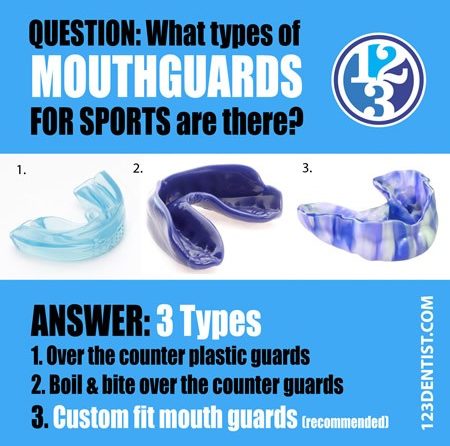
Dental Health Mouth Guards
Imagine what it would be like if you suddenly lost one or two of your front teeth. Smiling, talking, eating—everything would suddenly be affected. Knowing how to prevent injuries to your mouth and face is especially important if you participate in organized sports or other recreational activities.
Mouthguards, also called mouth protectors, are coverings worn over teeth, and often used to protect teeth from injury, from teeth grinding and during sports. Mouth guards help cushion a blow to the face, minimizing the risk of broken teeth and injuries to your lips, tongue, face or jaw. They typically cover the upper teeth and are a great way to protect the soft tissues of your tongue, lips and cheek lining. “Your top teeth take the brunt of trauma because they stick out more”. “Your bottom teeth are a little more protected because they are further back.”
There are three types of mouth guards:
- Stock mouth protectors are preformed and come ready to wear. They are inexpensive and can be bought at most sporting good stores and department stores. However, little can be done to adjust their fit, they are bulky, make breathing and talking difficult, and they provide little or no protection. Dentists do not recommend their use.
- Boil and bite mouth protectors also can be bought at many sporting goods stores and may offer a better fit than stock mouth protectors. The “boil and bite” mouth guard is made from thermoplastic material. It is placed in hot water to soften, then placed in the mouth and shaped around the teeth using finger and tongue
- Custom-fitted mouth protectors are individually designed and made in a dental office or a professional laboratory based on your dentist’s instructions. First, your dentist will make an impression of your teeth and a mouth guard is then molded over the model using a special material. Due to the use of the special material and because of the extra time and work involved, this custom-made mouth guard is more expensive than the other types, but it provides the most comfort and protection.
Generally, mouth guards cover your upper teeth only, but in some instances (such as if you wear braces or another fixed dental appliance on your lower jaw), your dentist will make a mouth guard for the lower teeth as well. Your dentist can suggest the best mouth guard for you. An effective mouth guard should be comfortable, resist tears, be durable and easy to clean, and should not restrict your breathing or speech.
If you grind your teeth at night, a special mouth guard-type of dental appliance — called a nocturnal bite plate or bite splint — may be created to prevent tooth damage.
Who Needs a Mouth Guard?
Mouth guards should be used by anyone — children and adults — who play contact sports such as football, boxing, soccer, ice hockey, basketball, lacrosse, and field hockey. However, even those participating in noncontact sports (for example, gymnastics) and any recreational activity (for example, skateboarding, mountain biking) that might pose a risk of injury to the mouth would benefit from wearing a protective mouth guard.
Adults and children who grind their teeth at night should have a nocturnal bite plate or bite splint made to prevent tooth damage.
Why Use a Mouth Guard When Playing Sports?
When there’s direct impact to the lower part of your face, the force can travel through your jaw, teeth and even the upper part of your skull. This can increase the risk of injuries like front teeth fractures and even concussions. Blows to your lower jaw might cause the jaws to slam together and damage both rows of teeth.
Mouthguards act as a buffer for these kinds of impact. The spongy material helps to absorb the shock and lessen the force applied to your teeth, jaws or skull.
Can I Wear a Mouth Guard if I Wear Braces?
Yes. Since an injury to the face could damage braces or other fixed appliances, a properly fitted mouth guard may be particularly important for people who wear braces or have fixed bridge work. Your dentist or orthodontist can determine the mouth guard that will provide the best protection for your unique mouth work. An important reminder: do not wear any orthodontic retainers or other removable appliance during any contact sports or during any recreational activities that put your mouth at risk for injury.
How Long Should Mouth Guards Last?
Mouth guards should ideally be replaced after each season because they can wear down over time, making them less effective. Replacement is especially important for adolescents because their mouths continue to grow and teeth continue to develop into adulthood. Many athletes who play several sports have new mouth guards made when they go for their six-month dental checkup.
How Do I Care for My Mouth Guard?
To care for your mouth guard:
- Rinse your mouth guard with cold water or with a mouth rinse before and after each use or clean it with a mild soap and a toothbrush.
- Clean the mouth guard in cool, soapy water and rinse it thoroughly.
- Place the mouth guard in a firm, perforated container to store or transport it. This permits air circulation and helps to prevent damage. If the mouth guard is acrylic, keep it in fresh clean water.
- Protect the mouth guard from high temperatures — such as hot water, hot surfaces, or direct sunlight — to minimize distorting its shape.
- Occasionally check the mouth guard for general wear. If you find holes or tears in it or if it becomes loose or causes discomfort, replace it.
- Bring the mouth guard to each regularly scheduled dental visit to have your dentist exam it.
Leave a reply
